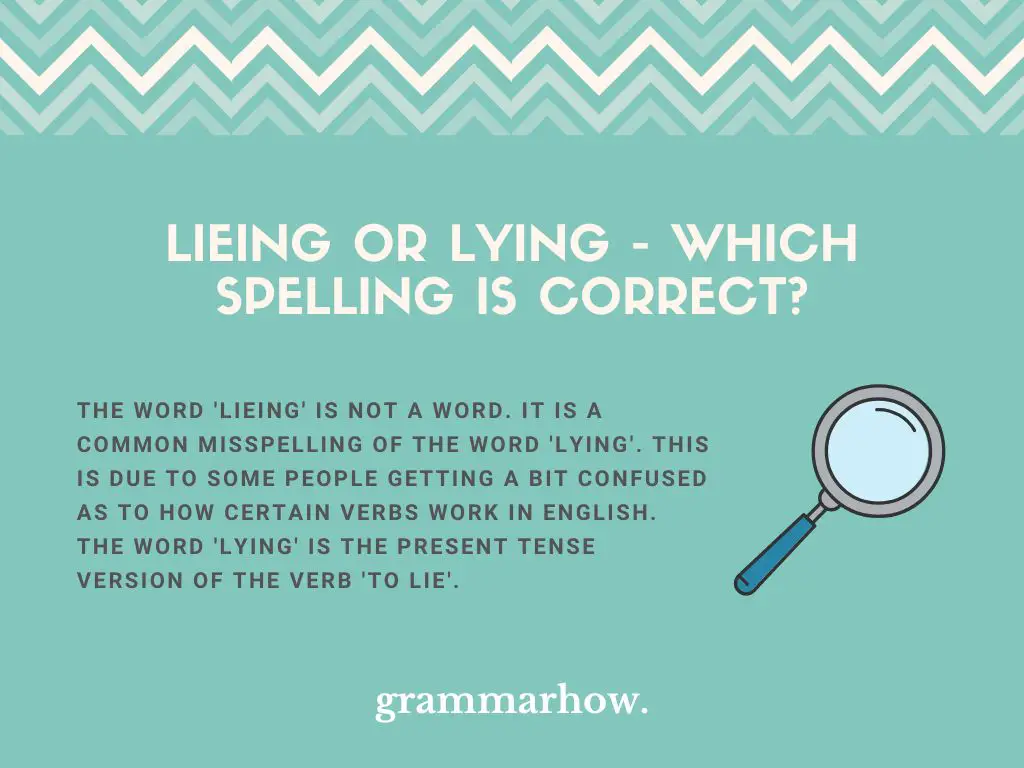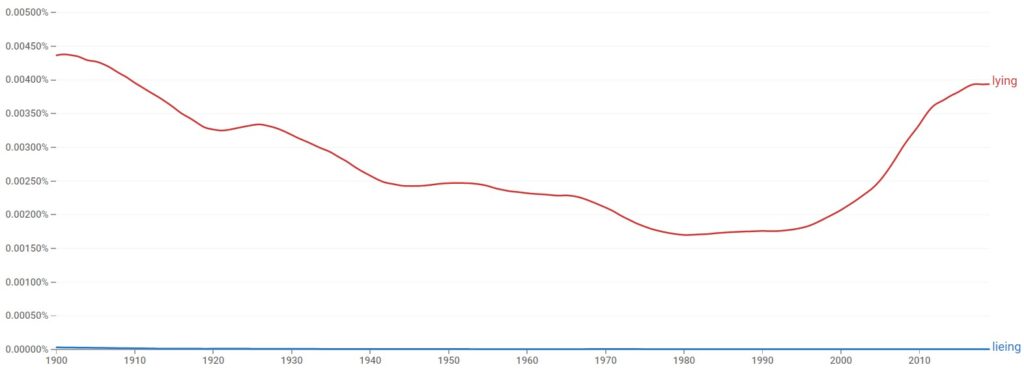A lot of people confuse the spellings ‘lieing’ and ‘lying’. This isn’t really a surprise. Some verbs can get a little bit confusing. So, which spelling is correct? Should you opt for ‘lieing’ or ‘lying’? That’s what we want to take a look at on this page.
Lieing or Lying – Which Spelling Is Correct?
The word ‘lieing’ is not a word. It is a common misspelling of the word ‘lying’. This is due to some people getting a bit confused as to how certain verbs work in English. The word ‘lying’ is the present tense version of the verb ‘to lie’.

It is easy to see why people often use the word ‘lieing’ instead of ‘lying’. With most verbs in English, you need to add ‘ing’ to the end of them in order to make them present tense verbs. However, this doesn’t work well with ‘to lie’ for a multitude of reasons. We have to drop the ‘ie’ and use a ‘y’ instead which, with most accents, should give the same sound.
The word ‘lying’ can, of course, have multiple definitions. The most common of these definitions is to either lay down horizontally on a flat surface, or to tell an untruth. However, these are not the only definitions of ‘lie’, and you will often need to look at context to understand what is going on.
Because ‘lieing’ is not a word, you are not able to use it instead of the word ‘lying’.
Lieing
‘Lieing’ is not a word. It is a misspelling of the word ‘lying’. People, particularly non-native English speakers, often use ‘lieing’ as they incorrectly believe that the present tense of the verb ‘to lie’ is ‘lieing’. It isn’t. It is ‘lying’.
We can understand why people do make this mistake. With some verbs, adding ‘ing’ to the end is going to make sense, and you will end up with a real word. However, this is not the case with ‘to lie’. This is because the English language very rarely wants to put two vowels together. Since ‘ing’ begins with a vowel, we need to make the ‘ie’ sound of ‘lie’ into a consonant. This is why we end up with ‘lying’.
So, is ‘lieing’ a word? No, it is not. It never has been a word. Because of this, we do not have any example sentences that we can share with you.
Lying
The word ‘lying’ is the present tense version of ‘to lie’. It means to either be laying down or to actually lie e.g. tell an untruth i.e. a ‘lie’. The word ‘lying’ is often misspelled as ‘lieing’. However, if you see the word ‘lieing’, we can assure you that the usage is incorrect.
The word ‘lying’ has multiple definitions. There are two that you are likely to encounter more than any other. This is how The Cambridge Dictionary defines them:
- to be in or move into a horizontal position on a surface.
- to say or write something that is not true in order to deceive someone.
Remember, the word ‘lying’ is the present version of the verb ‘to lie’. This means that ‘this person is currently doing this’.
Here are some examples of how to use the word ‘lying’ in a sentence:
- He was lying in his bed. It was very comfortable.
- She was wondering whether her child was lying to her.
- The ornament was lying on the other side of the room.
- Lying is a bad thing to do!
- His coat was lying exactly where he left it.
Which Is Used The Most?
According to Google Ngram Viewer, the word ‘lying’ gets a lot of use, while the word ‘lieing’ does not get any use at all.

This is something that does make sense. After all, ‘lieing’ is not a word. Since Google Ngram Viewer tracks word usage through all sorts of literature, it is never going to appear as being used often.
Final Thoughts
If you see the word ‘lieing’, it means that somebody has misspelled the word ‘lying’. This normally happens with non-native English speakers who are formulating the present tense of the verb ‘to lie’ incorrectly. Make sure that you always spell it ‘lying’ when writing in English.

Martin holds a Master’s degree in Finance and International Business. He has six years of experience in professional communication with clients, executives, and colleagues. Furthermore, he has teaching experience from Aarhus University. Martin has been featured as an expert in communication and teaching on Forbes and Shopify. Read more about Martin here.

